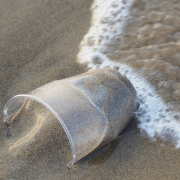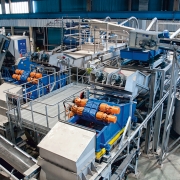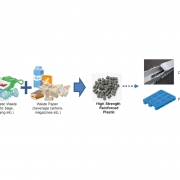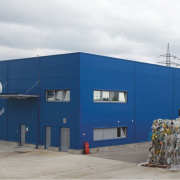Mozambique: On Search for Plastic Waste Reduction
While Mozambique‘s waste management sector, in general, shows the first signs of change, the treatment of plastic waste finds it difficult to leave the disastrous recycling rates behind. The problems already start with fixing the number of generated and handled materials.
A “final report for Mozambique” published by the IUCN and the UN environment program in 2018 suggests an overall import of 258 kilotons (kt) of plastic. Simultaneously three kilotons (kt) of primary and products and one kt as waste were exported; 72 kt changed in stock. Four kt were recycled. 51 kt ended up improperly disposed, and 109 kt uncollected, while 17 kt leaked into the environment. Another study on plastic waste flows in Mozambique conducted by the Institute for Future Initiatives at the University of Tokyo in 2020 shows that 1,470 tons of plastic waste were imported, while 481,260 tons were generated domestically. Finally, 1,225 tons went into export and 9,482 tons into recycling. 315,466 tons of uncollected waste and 144,378 tons of formally collected domestic mixed waste ended in open dumping. Some 7,219 tons were sorted from the open dump, so that 278,089 tons were open burned and 2,848 tons leaked into the ocean. In short: “Over 95 percent of plastic waste end up in open dumps, with about 60 percent open burned and less than 0,5 percent recovered and prepared for recycling or exports”, the study judges.
First steps of separation
Anyway: Attempts to tackle the leakage of plastic waste by organizations started in 2006 by a partnership called RECICLA including the Italian lay volunteers association LVIA, Caritas, CAFOD, the Veneto Region (Italy), GTZ-AGRESU, the Netherlands Embassy in Mozambique and the Municipal Council of Maputo. Formally established in 2007, “it is an economically-oriented organization rather than an organization which advocates for the interests of its members”, says an Organizing Brief of the network WIEGO. The material – polyethylene, polypropylene, plastic film and bags – mostly came from waste pickers or anyone who brought it. The plastic waste was manually processed by washing, sorting, cutting and grounding and sold as pellets to local firms that made household utensils like buckets or bowls. In 2011, RECICLA processed about 15 tons of plastic waste per month. In 2009, AMOR (Mozambique Recycling Association) started as a not-for-profit organization dedicated to promoting recycling and integrated solid waste management in Maputo by installing collection points and supporting 350 informal workers helping to collect and process the 400 metric tons of material sent to international markets for recycled materials, as the International Institute for Environment and Development published.
All plastic pellets are imported
Founded in 1995, Topack is Mozambique‘s only commercial plastic recycler, operating in four areas injection moulding, blow moulding, film extrusion, and PET for producing household utensils like baskets, bottles, boxes, tables and chairs. Another purchaser of plastic is Yopipila, using empty recycled bottles filled with sand to substitute cement blocks. According to the World Bank, the local PET Recycling Company PETCO “has contracted with external recyclers to buy post-consumer PET bottles and incentivize local collectors to recover packaging”. But instead of setting on the potential of these enterprises, the World Bank is convinced that “Mozambique is not a plastic producer, all plastic pellets are imported”. On the contrary: The Alliance for Malaria Prevention gave an account in 2020, that 70 percent of discarded plastics are objects composed of a mixture of PE, PET and others “for which recycling technology is non-existent in the country”. According to the UNEP/IUCN National Guidance for Plastic Pollution Hotspotting and Shaping Action National Report for Mozambique published in 2020, PET and LDPE are the “most critical” polymers, followed by PP and synthetic rubber. Prospectively, the dependence on external raw materials will not change, as the plastic import market of Mozambique is projected to grow steadily from 168 million Dollar in 2023 to 188 million Dollar by 2028. Conversely, the local plastic export market has shown a downward trend since 2005: In a Plastic Industry Outlook, the online magazine ReportLinker even expects a slight decline from about 2,1 million Dollar in 2023 to two million Dollar in 2028.
Chinese factories
The institution of foreign enterprises focussing on treating plastic waste did not help. IPED Plastics, a Chinese-owned factory producing plastic bags in Maputo Province, hit the headlines in 2018 with unhealthy and dangerous conditions for low wages, as the trade union criticized. In 2021, the plastic recycling plant in Zimpeto in Maputo Province was closed by a multi-sectorial team led by the National Institution for Inspection of Economic Activities (INAE). According to the Club of Mozambique, the plant “does not have a DUAT (i.e. Dual-Aggregation Transformer Network), a solid waste management plan, an environmental monitoring plan, nor does it hold updated and regular medical examinations of its workers or collaborators”. And in February 2024, an “allegedly illegal Chinese plastic recycling factory” named Shenxian Plastic Recycling Limitada running since 2022 reportedly affected its Infulene neighborhood by toxic smoke, contaminated water and a dump right outside the factory.
100,000 tons of plastic discarded
The Mozambican government is conscious of what the World Bank calls “negligible material recovery rates” as well as of the fact, that “all collected plastic waste is improperly disposed of in open dumpsites and only a small amount is recycled”, as the Club of Mozambique quoted Ivete Maibaze, the Minister of Land and Environment. She admitted that “100,000 tons of plastic waste are annually discarded into the environment, jeopardizing the country’s rivers and oceans”. Moreover, she was aware of plastics affecting the fisheries directly through damages to ships, plastic in fishnets and abandoned fishing gear.
But aside from introducing the digital waste app, the government in Mozambique did little to force plastic waste recycling and reduce its leakage. All that is known: In July 2015, a new decree to limit the use of plastic bags was envisaged. The order seems not to have been very effective, as in June 2022, the Mozambican authorities adopted another law to ban the use of plastic bags starting by 2024.
The private sector – the most important driver
The Sustainability Middle East & Africa Magazin quoted Ivete Maibaze: “The proposal for a regulation on the banning of plastic is already being heard and the country will align itself with the international and national commitments that the government has made through her ministry.” The local government relies on several regional and international strategic alliances as well as sources for support and potential funding. This is what the World Bank recommends: “A deep coordination across various national and local government entities and their respective mandates”. And not to forget that “the most important driver of a continued transition remains in the hands of the private sector”. One can be excited of the Mozambican envisaged “upcoming National Action Plan to Combat Marine Litter”.
(Published in GLOBAL RECYCLING Magazine 3/2024, Page 25, Photo: Petra Hoeß, FABION Markt + Medien / abfallbild.de)









